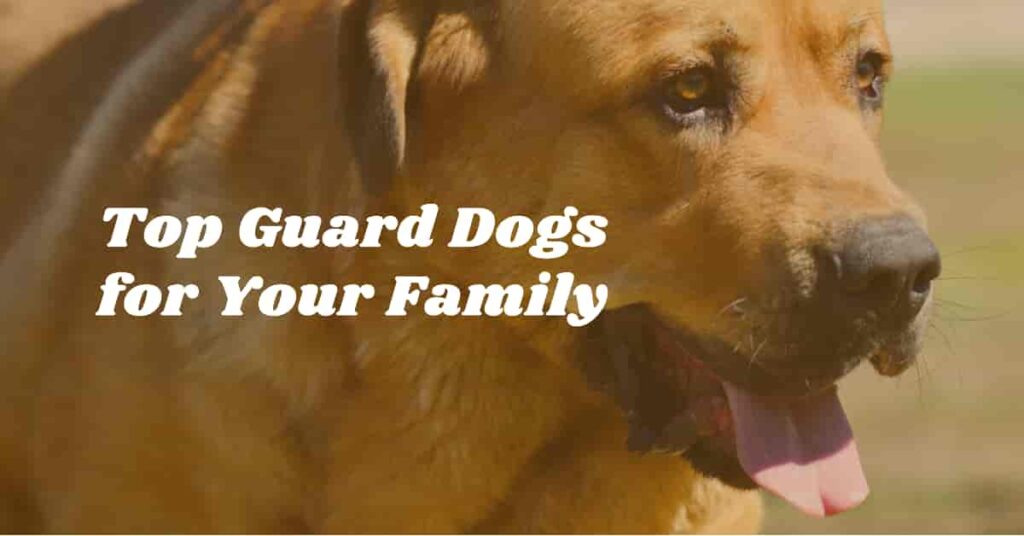When it comes to family security, a reliable guard dog can be an invaluable asset. The best guard dogs for families offer not just protection but also companionship and love. This article will guide you through the essential factors to consider when choosing the perfect guard dog for your family.
Table of Contents
Qualities of a Good Guard Dog
Temperament
A good guard dog should have a balanced temperament. They need to be alert and responsive but not overly aggressive. Their primary role is to deter intruders, not to harm them.
Size and Strength
While size isn’t everything, a larger dog can be more intimidating to potential intruders. However, strength should be coupled with control and obedience to ensure they can effectively protect your family.
Trainability
A high level of intelligence and trainability is crucial for a guard dog. They need to understand and follow commands promptly, distinguishing between normal and threatening situations.
Sponsored Ads
Choosing a dog with the right qualities can make all the difference in how effectively they serve as a guard dog while also being a loving member of your family.
Top Guard Dog Breeds for Families
German Shepherd
Personality Traits
German Shepherds are known for their intelligence, loyalty, and versatility, making them one of the best guard dogs for families. They are naturally protective and form strong bonds with their family members.
Care Requirements
German Shepherds are high-energy dogs that require regular exercise and mental stimulation. Their double coat needs frequent brushing, especially during shedding seasons. A balanced diet is essential for maintaining their health and energy levels.
Rottweiler
Personality Traits
Rottweilers are strong, confident dogs with a natural instinct to protect their home and family. They are generally calm and collected but can spring into action if they sense a threat.
Sponsored Ads
Care Requirements
Rottweilers have a short, dense coat that is relatively easy to maintain with regular brushing. They require consistent exercise to keep them physically and mentally fit. Due to their size, they are prone to certain health issues like hip dysplasia, so a well-balanced diet is crucial.
Doberman Pinscher
Personality Traits
Doberman Pinschers are known for their sleek physique and sharp intelligence, making them highly effective as guard dogs. They are alert, fast, and capable of making quick decisions, which is essential for family protection.
Care Requirements
Dobermans have a short coat that is easy to maintain with minimal grooming. They are active dogs that require regular exercise to keep them mentally and physically fit. A balanced diet is crucial, as they are prone to certain genetic health issues like cardiomyopathy.
Bullmastiff
Personality Traits
Bullmastiffs are large, imposing dogs with a natural protective instinct. They are generally calm and gentle with their families but can be very intimidating to strangers, making them excellent guard dogs.
Sponsored Ads
Care Requirements
Due to their size, Bullmastiffs don’t require as much exercise as some other breeds but still benefit from regular short walks. Their short coat is easy to care for, needing only occasional brushing. A well-balanced diet is essential to manage their weight and overall health.
Special Considerations for Families
Children and Guard Dogs
Safe Interactions
It’s crucial to teach children how to interact safely with a guard dog. This includes understanding the dog’s body language and knowing when it’s appropriate to approach the dog, especially during feeding or when the dog is on duty.
Socialization
Early socialization between the dog and children can foster a healthy relationship, ensuring that the dog sees the children as part of its pack to protect.
Space Requirements
Adequate Living Space
The size of your home and yard can influence your choice of a guard dog. Larger breeds may require more space to move around comfortably, while smaller breeds may be better suited for apartments or homes with limited space.
Sponsored Ads
Secure Boundaries
Regardless of the breed, a secure yard with fencing is essential to prevent the dog from wandering off and to provide a safe environment for both the dog and potential visitors.
Training Requirements
Obedience Training
A well-trained guard dog is an effective one. Consider enrolling your dog in obedience classes, and if possible, more specialized guard dog training programs.
Consistency
Consistent training and reinforcement are key to maintaining the dog’s skills and ensuring they respond appropriately in different situations.
Understanding these special considerations can help you make an informed decision when choosing the best guard dog for your family, ensuring a harmonious relationship between your new pet and all family members.
Training Your Guard Dog
Basic Obedience
Before diving into specialized guard dog training, your dog should master basic obedience commands like sit, stay, and come. These foundational skills are crucial for effective communication and control.
Specialized Guard Dog Training
Alert Barking
Training your dog to bark when someone approaches the property is a useful skill. This not only alerts you but also acts as a deterrent for potential intruders.
Command-based Actions
Teaching your dog specific commands for guarding can be invaluable. Phrases like “watch” or “guard” can be used to put your dog into a protective mode.
Professional Training Options
If you’re not comfortable training your dog yourself for guarding duties, professional trainers offer specialized courses that can be highly effective.
Conclusion
Choosing the best guard dog for your family involves more than just picking a breed; it requires careful consideration of various factors like temperament, size, and trainability. Additionally, the dog’s relationship with family members, especially children, and its living conditions are crucial elements to consider. With the right training and ongoing care, a guard dog can provide not only security but also become a cherished member of your family.

